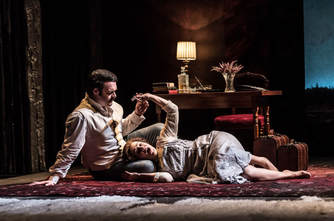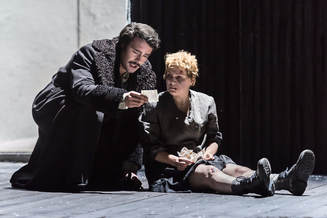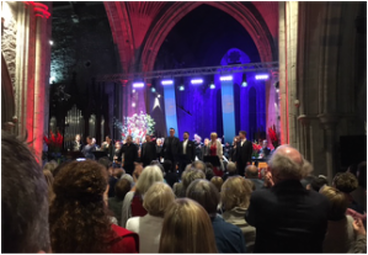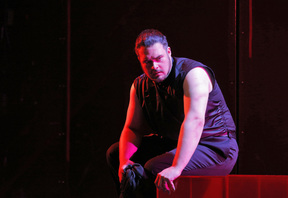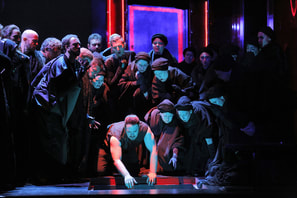The 29th bard music Festival
"Marfa, the daughter of a Boyar, is desired by every man who sees her. Her choice is Lykov, sung by tenor Gerard Schneider.
The beauty of his voice is deserving of love..."
The Tsar's Bride, Review: Berkshire Fine Arts, 2018
"Gerard Schneider’s voice has an intense timbre typical of Russian tenors, which lent his Mozart an idiomatic sound,
and Schneider agreeably projected the Austrian composer’s good nature. "
"Gerard Schneider, who previously sang Mozart, scored another success with Likov..."
Mozart and Salieri, and Tsars Bride, Review: New Criterion, 2018
"The standout stars were the tenor Gerard Schneider and the mezzo Nadezhda Babintseva"
Legacy of Pushkin, Review: New York Times, 2018
'Thaïs' at Minnesota Opera
Trailer: Minnesota Opera's Thaïs
" But the most memorable portrayal of the evening was Gerard Schneider’s wonderfully Gallic Nicias, brimming with finesse and joie de vivre.
The Australian-born tenor, in an auspicious company debut, offered the perfect antidote to Athanaël’s dour lessons in anhedonia;
one felt the audience relax—and then smile--en masse..."
Review: Opera News, 2018
"Gerard Schneider provided a colorful foil to Meachem as the sybaritic Nicias in his Minnesota Opera debut. Ardent and irreverent where Meachem was straight-laced and sober, Schneider’s ringing tenor made a sharp impression."
Review: Star Tribune, 2018
"Tenor Gérard Schneider played the foil brilliantly, convincingly portraying the sybarite Nicias in way that made you want to forget all about the
spiritual and succumb to the pleasures of easy living. Moreover, Schneider managed to make us really care about the character
– something that isn’t particularly easy with this role."
Review: Bachtrack, 2018
"Austrian tenor Gerard Schneider plays the dissolute satrap Nicias, whose over-the-top scenes
are the opposite of the sexual repression of the conflicted Athanaël.
Nicias’ Alexandria is the embodiment of sensual excess and wild abandon, and Schneider’s smartly sung Nicias is wholly comfortable in being the leader of an orgiastic following. In addition to his strong vocal performance, Schneider proved to be a commendable dancer as well,
briefly joining the dance troupe in a section of the opera’s second act ballet."
Review: Opera Warhorses, 2018
"I would like to go to many parties hosted by Nicias (played wonderfully by the tenor Gerard Schneider), decorated by Lorenzo Cutùli
and lit by Marcus Dilliard. They out-Gastby’d the Gatsby in that scene."
Review: Twin Cities Arts Reader, 2018
"Also worth noting is Austrian-Australian tenor Gerard Schneider’s last-minute performance of Nicias. That’s right - filling in at the eleventh hour (rehearsals began on twelfth of April with a call going out to Schneider on the sixth before) for John Robert Lindsey, Schneider - who makes no mention of having sung the role before in his published biography - delivered a most fun and engaging performance!
I was quite pleased to give a more robust ovation at the end as he entered the stage to receive his much-deserved adulation. What a voice! As much as I enjoyed listening to tenor Joshua Dennis sing the role of the Duke in this season’s performance of Rigoletto, a dear friend of mine made me wonder what it would have been like to have heard Schneider in the role. Again, what a voice!"
Review: Life in Revue, 2018
'LA Straniera' at Washington Concert Opera
Highlights: Washington Concert Opera 2017 (La Straniera begins at 1:35)
"Happily, WCO’s performance was the best, aided especially by tenor Gerard Schneider as Arturo, fresh from Wexford. As there (both in recital and in the lead of Risurrezione), he was wonderfully articulate with Bellini’s radically syllabic text and exhibited impressive legato phrasing in Bellini’s numerous arioso passages, with moments of exquisite mezzo-voce as well as full fortissimo..."
Review: Opera con Brio, 2017
'Risurrezione' at the Wexford Opera Festival
Preview: Behind the Scenes at Wexford Opera Festival, Irish Times, 2017
"Prince Dimitri, played by the Australian tenor, Gerard Schneider also put in a strong performance. He has a sweet sounding tenor, with strong upper register. His essaying of the role perfectly matched Duprels’ Katiusha. His acting and expressive singing convincingly characterizing the arrogance of the aristocrat in the first act, and then his remorse in act three.
His final duet with Duprels, in which they sing of their love for each other, followed by the chorus welcoming Christ’s rebirth, brought the drama to a wonderful conclusion, in which Katiusha and Dimitri are redeemed by each other’s love"
Review: Operawire, 2017
"The cast were all very good, with tenor Gerard Schneider (Dimitri) strongly leading it. He executed equally radiantly
the highest pitches and the pianissimos, with an extremely alluring and delectable timbre. "
Review: Bachtrack, 2017
"It seemed fitting when tenor Gerard Schneider first entered, debonair in boots, breeches and blue frock-coat, looking unnervingly like a cross between Terence Stamp’s Sergeant Troy and Leigh Lawson’s Alec Stokes-d’Urberville!
Schneider sang with honeyed warmth - in fact, so beautiful was his tone that at times it was difficult to remember that Dimitri has behaved with selfish, reckless irresponsibility. Perhaps that’s the point: Schneider just about pulled off the difficult task of making us feel some sympathy for the abusing aristocrat; after all, as he says when he finds Katiusha in prison, debauched, degenerated, utterly ‘spoiled’, it is his Calvary that begins here too."
Review: Opera Today, 2017
“Ihr zur Seite überzeugt in ebensolcher Hochform Gerard Schneider als Prinz. Der Tenor verfügt über unbekümmerte und scheinbar grenzenlose stimmliche Strahlkraft und einen ungezwungenen jugendlichen Auftritt, der der Entwicklung der Rolle große Überzeugung verleiht.”
“At her side, just as convincing and in top form, was Gerard Schneider as the prince. The Tenor was carefree, had seemingly limitless vocal radiance and a casual youthful appearance, which gave the development of the role great conviction.
Review: Opera-Online, 2017
"Son grand amour, le prince Dimitri, avait la fougue et le ténor ardent de Gerard Schneider, aussi convaincant comme
homme d’honneur qui veut réparer sa faute. "
"Her great love, Prince Dimitri, had the fire and ardent tenor of Gerard Schneider; convincing as a man of honor
who wants to repair his fault."
Review: Crescendo Magazine, 2017
Singing with force and vigour, Australian tenor Gerard Schneider delivers a memorable account of Dimitri, the prince
whose carelessly cruel act precipitates Katiusha’s disastrous fall but who belatedly attempts to make amends.
Review: The Stage, 2017
"De rol van Dimitri werd gezongen door de tenor Gerard Schneider. Hij heeft een onwaarschijnlijk mooie stem. Zijn warme lyriek kwam mooi tot uiting in de liefdesverklaring "E non temere, o dolce mia fanciulla". Tot in de hoogste regionen behoudt zijn stem die natuurlijke warmte, inclusief een prachtig mezza voce. Een wonderbaarlijke tenor om in de gaten te houden..."
The role of Dimitri was sung by Gerard Schneider. He has an inconceivably beautiful voice. His warm lyricism came beautifully to expression in the declaration of love "E non temere, o dolce mia fanciulla...' Up to the highest regions his voice retains that natural warmth, including a beautiful mezza voce. A miraculous tenor to keep your eye on...
Review: GoOpera, 2017
“Der Wexforder Erfolg verdankt sich nicht nur der Überzeugung, mit der Francesco Cilluffo das Orchester detailmalerisch durch die seelenvolle veristische Partitur führte, sondern auch der dramatischen Kraft von Anne Sophie Duprels in der Partie der durch den Schmutz des Lebens geschleiften Katjuscha. Geschwängert und sitzengelassen von ihrer großen Liebe, dem von Gerhard Schneider mit warmem, baritonal gefärbtem Tenor gesungenen Fürsten Dimitri, fällt sie von Unschuld in Verderbtheit, von der Prostitution in die Zwangsarbeit. In der sibirischen Verbannung, wohin ihr der reuige Fürst folgt und um ihre Hand anhält, findet das Paar durch Entsagung Läuterung. “
Alle Augen und Ohren waren im Voraus auf „Medea“ gerichtet. „Risurezzione“ hat ihr jedoch die Schau gestohlen."
"The Wexford success owes not only to the conviction with which Francesco Cilluffo led the orchestra in detail through the soulful veristic score, but also to the dramatic power of Anne Sophie Duprels in the role of Katyusha dragged through the filth of life. Tortured and abandoned by her great love, Prince Dimitri, sung by Gerhard Schneider with a warm, baritonal tenor, she falls from innocence to depravity, from prostitution to forced labor. In Siberian exile, where the repentant prince follows her and stops for her hand, the couple finds purification through renunciation.
All eyes and ears were focused on "Medea" in advance. However, "Risurezzione" has stolen her the show.”
Review: Frankfurter Allgemeine, 2017
“Situazione felicissima e ideale per i due giovani protagonisti, chiamati a dar voce e corpo ai due unici personaggi ben definiti che emergono da un manipolo di seconde parti e una miriade di caratteristi: l’aristocratico Dimitri, che Gerard Schneider ha reso al meglio con la sua solare voce da tenore lirico, senza mai indulgere a pericolosi e inopportuni affondi veristici…”
“[This production], most fortunate and ideal for the two protagonists, gave voice and body to the only two well defined characters that emerge over a handful of secondary roles and a myriad of character actors: the aristocratic Dimitri, that Gerard Schneider embodied best with his radiant Lyric Tenor voice, never indulged in dangerous and inappropriate Veristic effects…”
Review: Giornale della Musica, 2017
"The impact of Alfano's 1904 opera Risurrezione at Wexford last night brought the audience to their feet, and the prolonged applause and cheering said it all - the audience had been captured by a mixture of an extremely effective piece and stunning performances all round, especially from the two people pictured above (Gerard Schneider, and Anne Sophie Duprels)
This production is said to be going to Monte Carlo so if you can't get to Wexford in the next two weeks the Côte d'Azur is not such a bad alternative in due course! But they had better get Duprels and Schneider - they really made it work. "
Review: Instant Encore, 2017
"Gerard Schneider, ein Tenor von beachtlicher Ausstrahlung, macht aus Dimitri einerseits den unwiderstehlichen Verführer
und andererseits den ehrlich bereuenden Mann, der Erlösung in der Religion findet..."
"Gerard Schneider, a tenor of remarkable charisma, makes Dimitri on one hand the irresistible seducer and on the other,
the honestly repenting man who finds salvation in religion..."
Review: Kieler Nachrichten, 2017
Tenor Gerard Schneider gave life to Prince Dimitri and was well suited and convincing. He’s a very expressive singer, and was especially exciting in the final two acts, particularly in the scene with Katiusha in Act III.
Review: Seen and Heard International, 2017
Full marks to Anne Sophie Duprels, a marvellously resourceful singing actress who gives her all to the character
of the seduced maiden turned whore, and Gerard Schneider as her penitent seducer.
Review: The Telegraph, 2017
The focus is very much on Dmitri and Katiusha for most of Act I, much of Act II, the latter part of Act III
and all of Act IV. Considering the challenging nature of their characters' predicaments,
that places a lot of pressure on Gerard Schneider and Anne Sophie Duprels, but both take their parts
exceptionally well, remaining strong and consistently lyrical throughout.
Review: Opera Journal, 2017
Tegenover Duprels stond tenor Gerard Schneider, die zich net zo goed raad wist met zijn partij.
Zijn stemgeluid was heerlijk Italiaans, met lekker veel squillo"
"Opposite Duprel stood tenor Gerard Schneider, who handled his role just as well.
He has a lovely Italianate voice with a delicious amount of squillo."
Review: Place de L'Opera , 2017
"Gerard Schneider stattet den Prinzen Dimitri mit kräftigem Tenor und sauberen Höhen aus, entwickelt sich aber erst ab dem dritten Akt zu einem positiven Charakter, wenn er Verantwortung für das Unglück übernimmt, in das sein Verhalten Katiusha gestürzt hat. Nach den leichtfertigen Liebesschwüren im ersten Akt bekommt das Duett im dritten Akt musikalisch eine gewisse Tiefe, die von Schneider und Duprels bewegend umgesetzt wird"
"Gerard Schneider equips Prince Dimitri with a powerful tenor and crisp high notes, and develops in the third act in to a positive character, when he takes responsibility for the disaster into which his behavior has plunged Katiusha. After the frivolous love-vows of the first act, the music gains a certain depth in the third act, which is propelled by Schneider and Duprels."
Review: Online Musik Magazin, 2017
"Haar grote liefde, prins Dimitri, had de onstuimigheid en de gepassioneerde tenor van Gerard Schneider, even overtuigend als de berouwvolle man die probeert eervol te handelen maar door Katiusha afgewezen wordt."
"Her great love, Prince Dimitri, had the impetus and passionate tenor of Gerard Schneider, convincing as the repentant man who tries to act honorably but is rejected by Katiusha."
Review: Klassiek Centraal, 2017
"Prince Dimitri was sung by the outstanding young Australian tenor, Gerard Schneider, who has a wonderfully elegant
and deep tenor sound of real substance."
Review: Opera Spy, 2017
"Gerard Schneider’s Dimitri is very fine too. He has a good, solid voice and his characterization was spot-on."
Review: Operalounge, 2017
VOCAL RECITAL AT THE WEXFORD OPERA FESTIVAL
On November 4, tenor Gerard Schneider gave the most thoughtfully programmed recital that I heard this season at Wexford. A native of East Melbourne, Australia, Schneider has one of the most beautifully produced and attractive male voices I’ve heard in some time. He has a solid core to his voice and his high, soft singing is mesmerizing. He also seems incapable of uttering a gauche or unmusical phrase. He opened his program with “Im wunderschõnen Monat Mai,” “Aus meinen Tränen spriessen” and “Ich grolle nicht” from Schumann’s Dichterliebe, sung with a masterly textual sensitivity. He scored a triumph with Vaughan Williams’s “Silent Noon” and the aria “Horse Hoofs, Horse Hoofs” from Hugh the Drover, which he announced as a work about “freedom and loneliness on the road—something an opera singer feels quite strongly.” His pianist, Andrea Grant, the festival’s Head of Music/Répétiteur, gave the most searching and complete accompaniment to this aria I have ever heard. In both Liszt’s “Im Rhein, im schönen Strome” and Ben Moore’s lyrical “His Heart That Flutters,” Schneider showed off his gift for lifting easily into his gorgeous upper range.
Review: Brian Kellow, 2017
'Katya KaBANOVA' at thE Lincoln CentER
"Mr. Schneider brought out Boris’s desperate longing for Katya through his plangent singing during their illicit love scene..."
Review: New York Times, 2017
"The work’s three tenor parts were uncommonly well served, with excellent diction. Gerard Schneider proved a near-ideal Boris, with warm, ardent sound."
Review: Opera News, July 2017
"El tenor Gerard Schneider, encargado del papel de Boris, el amante de Kabanova, mostró buenos medios de tenor lírico, y su interpretación fue creciendo desde una discreta entrada, a unas vehementes escenas con Katia en los actos segundo y tercero."
"Tenor Gerard Schneider, charged with the role of Boris, the lover of Kabanova, showed good means with his lyric tenor voice; his interpretation growing from a discreet entrance, to some vehement scenes with Katya in the acts second and third.
Review: Codalario, 2017
"Tenor Gerard Schneider, excelled as Boris, who goes off to Siberia after his relationship to Katya is made public..."
Review: Musical America, 2017
"As his nephew Boris, tenor Gerard Schneider used his fine instrument and effective acting to create a romantic hero,
in spite of the fact that Janacek eschewed Romanticism..."
Review: Voce di Meche, 2017
'IDOMENEO' AT THE kILKENNY aRTS fESTIVAL
“The youthful Austrian-Australian Gerard Schneider (whose credits include the title role in La clemenza di Tito in Salzburg) was new to Idomeneo, replacing a sick John Mark Ainsley at one weeks' notice. Though slightly book-bound in the recitatives, there was nothing tentative about the glorious power with which he dispatched ‘Fuor del mar’.
The warm, Italianate sheen of his tenor was a constant pleasure, not least in its distinctive mezza voce.
Schneider is already a superb singer, and given time he’ll be a superb Idomeneo.“
Review: 'Opera' Magazine, December 2016
“The singing is excellent, led by a thrilling performance from tenor Gerard Schneider, plucked from the relative
obscurity of his studies at the JuIlliard to step in for indisposed John Mark Ainsley. Looking like a young Pavarotti,
Schneider has an imposing stage presence with a vivid range of colour and warmth of tone that compels attention...”
Review: Irish Examiner, 2016
'Iris' at the bard summerscape festivaL
Preview: Italianate Ardor, Beyond Puccini
The New Yorker, Alex Ross
Preview: ‘Iris’ weaves mythic tale of innocence, venality
Poughkeepsie Journal, Darrah Cloud and David Simpatico
Video Interview: Gerard Schneider in Bard SummerScape 2016’s production of “Iris”
“As Osaka, Gerard Schneider sang in a handsome, clarion tenor that he moulded to an
elegant croon for the softer, seductive passages in Act 2.”
Review: 'Opera' Magazine, December 2016
"The heroic tenor arias of the villainous Osaka call to mind Strauss’s challenging music for Bacchus in “Ariadne auf Naxos,” still more than a decade in the future...Gerard Schneider’s imposing tenor made Osaka’s libido vivid"
Review: The Wall Street Journal, 2016
"Tenor Gerard Schneider lends great variety and range to Osaka’s pleas for Iris’s favors..."
Review: Cultural Weekly, 2016
'...Conducted by Botstein, well cast (with an outstanding young tenor Gerard Schneider) and, for the most part, intelligently staged, the Bard Iris made a strong case for the opera’s musical qualities...'
Review: OperaPost, 2016
"...Tenor Gerard Schneider stole the show. In the role of Osaka, this young artist was the most impressive singer on the stage.
From the moment he opened his mouth I was truly transfixed and besotted with the sheer beauty, power and virile sweetness
of his singing. His is a soaring heart-wrenching tenor, an Italianate tenore spinto of the true romantic hero type...
...Osaka’s character is controversial and complex....His music is so romantic and he sounds so genuine that there must be something true in his declarations of “love,” at least when the character is in Schneider’s able hands..."
Review: Allegri con Fuoco, 2016
"Austrian-Australian Tenor Gerard Schneider is the real deal. His rich, expressive tenor was full of desire..."
Review: Berkshire Fine Arts, 2016
'Tenor Gerard Schneider worked his gleaming tones expertly to educe the many facets of the preening young libertine Osaka – cad, narcissist, sybarite, even callow, would-be romantic. Indeed, from the moment of Williams’ and Schneider’s entrance, perched above the horizon, ebon-clad, spying down upon Iris like two great predatory birds, they exerted a hypnotic fascination...'
Review: My Scena, 2016
"Gerard Schneider showed appealing tenor timbre as the scheming suitor Osaka, a role evidently designed around its creator
Fernando De Lucia’s remarkable ability to sing in the upper passaggio"
Review: Opera News, 2016
"Gerard Schneider’s beefy tenor pumped Osaka’s passionate phrases full of testosterone..."
Review: The Observer, 2016
"Tenor Gerard Schneider impressed as Osaka, the opera's anti-hero. His bright tone and bold onstage presence made this character's dimensions come out, testament to the skill of the libretto and his acting as well as the power of his singing..."
Review: Super-Conductor, 2016
"Satisfying Italian Robustness..."
Review: WQXR, 2016
"Gerard Schneider acquitted himself well of the difficult task of singing the delicate tessitura in the serenade “Apri la tua finestra"
Review: BachTrack, 2016
"Osaka, the youth who sets his sights on Iris, was sung with a limpid, gleaming upper register by Gerard Schneider. [His voice] never loses potency and his “Apri la tua finestra” serenade was spun out gorgeously..."
Review: Opera Teen, 2016
"Gerard Schneider's full-throated tenor met all of Mascagni's challenges..."
Review: Voce di Meche, 2016
"The tenor, Gerard Schneider as "Osaka" in robust and buoyant voice attempts to woo [Iris] with jewels..."
Review: Polly Guerin, 2016
'Der kaiser von atlantis' at the lincoln center
"Both tenor Gerard Schneider and bass Daniel Mirosław brought real bel canto virtues to the first scene of Der Kaiser.
Their singing suggested that even in the harshest of realms, beauty can thrive."
Review: Opera News, 2015
"Harlekin was very well performed and sung by tenor Gerard Schneider in the crispest German imaginable."
Review: Voce di Meche, 2015
Nuernberger Symphoniker Oper Gala
"Der charismatische Tenor Gerard Schneider begeisterte nicht nur durch sein Stimmvolumen, er zeigte unverblümt während
und unmittelbar nach seinem Auftritt, wie sehr ihm die Musik am Herzen liegt..."
(The charismatic tenor Gerard Schneider did not only thrill by the volume of his voice - both during and after his performance
he showed unmistakable how close to his heart music is...)
Review: Mittel Bayerische, 2015
"Dein ist mein ganzes Herz, die arie des Prinzen Sou Chong, interpretieret von Gerard Schneider, setzte den Glanzpunkt zur Gala.
Die grandiosen stimmen wurden mit tobendem applaus, roten Rosen, grossen Blumenbuketts
und beifallsbekundungen des Orchesters belohnt..."
(Dein ist mein ganzes Herz, the aria of Prince Sou Chong , interpreted by Gerard Schneider was the highlight of the gala . The grandiose voices were rewarded with rapturous applause, red roses ,large bouquets of flowers and the applause of the orchestra ...)
Review: Marlen News, 2015
IL TROVATORE At the SALZBURGER Festspiele
'..It was heartening to see the role of Ruiz so convincingly sung and acted by the young tenor Gerard Schneider...
Review: Opera News, 2014
La Clemenza di Tito
"Gerard Schneider als Tito der ersten Premiere überzeugte mit einem klangfarbenreichen Timbre in leisen Pianopassagen,
das er im zweiten Akt auch in kraftvollen Fortepassagen zu bewegender Wirkung bringen konnte..."
(Gerard Schneider as Tito in the Premiere convinced with a sound rich in timbre in quiet, piano passages and in the second act
was also able to create a moving effect with forceful forte passages...)
Drehpunktkultur, 2014
The Cooper and San Giovanni Battista
"As his nemesis, the sweet but not over-bright young cooper Colin, Gerard Schneider shows enormous promise. This is a bold, warm tenor voice and lends real colour to Arne’s simple, strophic songs."
The Arts Desk, 2014
"As the scheming apprentice Colin, Gerard Schneider revealed a strong, true tenor and a superb ability to act with the voice, coaxingly sweet in the tender moments, more ardent as his feelings welled, and nimble in the neat slapstick"
Opera Magazine, 2014
"Schneider was similiarly resonant as the King's Machiavellian counsellor in San Giovanni Battista.
His duet with Alison Langer's Erodiade was beautifully lyrical and demonstrated ease across a wide tessitura..."
Opera Magazine, 2014
L'Enfant Prodigue
"Gérard Schneider (Azaël, the prodigal son) all conveyed despair, hope, repentance and joy with moving musicality"
BachTrack, 2013
"...(Azael) was played by Gerard Schneider, who sailed through the role’s range with considerable power and control –
you could easily imagine him in a romantic tenor lead..."
The Classical Source, 2013
"...Gerard Schneider is impressive as the Prodigal son, Azael, with an expansive, manful, lyric tenor voice
which will surely develop into something even bigger with time..."
Capriccio, 2013
Owen Wingrave
"...However, the palm undoubtedly goes to Gerard Schneider as General Sir Philip Wingrave, who managed to convey the character's age without the need for a lot of hokey make up, and has a clear and powerful tenor voice that wasn't fazed by the rather unexpected coloratura Britten expects of him..."
Bachtrack, 2013
"...Gerard Schneider presents an extremely convincing portrait of a bellicose and irascible patriarch
in General Sir Philip Wingrave - I was particularly impressed by the ease with which he rendered the music
as heightened speech in his impetuous tirades against Owen..."
Capriccio, 2013
Australian Singing Competition
"...Gerard Schneider has about the most attractive tenor this side of Richard Tauber. Last year, he played Rodolfo in La Boheme, so if you were left wondering 'who's that guy with the sweet chops?', now you know.
I was enraptured with the pleasing quality of his voice; though pleasing is an adjective unintentionally liable to damn him with feint praise. Suffice to say he glides up and down the tenor's scale so nimbly and smoothly, even a Domingo would be depressed. If he can touch two F's above, I wouldn't be surprised.
Schneider fronted with Che Gelida Manina from La Boheme by Puccini; brave, given is latter-day association with Pavarotti, but neither he, nor we, had cause to fear, since he effortlessly rose to the occasion.."
Crikey, 2011
